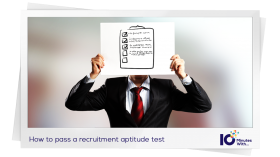How Nigerian Candidates Now Cheat in Aptitude Tests

Austin Archibong
Certainly, there would be downsides to having such a huge population as Nigeria is fortunate or unfortunate to have. However, the plights of entry-level graduate jobseekers in Nigeria is not about to reduce. There are barriers after barriers, requirements after requirements, spec after spec, and many stages involved to get an interview invite and ultimately a job offer.
Age cap keeps reducing
It is pretty standard these days for organizations to ask for graduates aged 26 and below. Some have taken it a notch higher by requesting candidates aged 23 and below. The idea of seeking fresh graduates 0-12 or 0-24 months after NYSC did not yield as much fruit as ‘too much’ fall in that category. The unpredictable education system in Nigeria still churns out graduates deemed not young enough. With the large pool available in the market, the average asking age is reducing; 23 and below is the new fad!
Even if the degree awarding institutions are considered: foreign-obtained degrees, private varsities, and graduates from top local schools and relevant course of study employed as a sorting tool, the pool of prospective candidates is still very large. Add age barrier: 26 and just a little more candidates are shaved off. If the ideal age is reduced, the pool significantly reduces. You have young, fresh, and dynamic candidates to choose from. Nevertheless, the pool is in its thousands if not hundreds of thousands.
How candidates now beat the test system
The use of aptitude tests, either an online one before a physical verification, or a physical computer based test, is now the sorting tool in the first and second stages of most recruitment. However, many desperate graduates are already seeking ways to gain an advantage.
With aptitude tests being the new plight jobseekers have to overcome, they constantly seek ways to get any edge whatsoever. In recruitment processes involving initial online tests, it is not uncommon for jobseekers to get ‘experts’ to help them. The expert can be a bright candidate that has passed the test or an individual that applied with fake or bogus details for the purpose of helping such candidates. Recruitment processes that are known to employ online tests in the first or second stages would surely notice a lot of these phony resumes candidates use just so they write the test first before they use their main account.
In some cases, candidates get their results from online test immediately or a day or two after while the recruitment process is ongoing, and the questions are very similar if not the same. Why should candidates apply with their real details at first, when they can get significant advantage in a process that would likely screen off 50 percent or more?
Some candidates resort to switching off the data services of their devices to get extra minutes before switching it back on. In some test designs, this doesn’t work but in more cases than others, switching off data can get candidates to refresh or beat the system. Anyway, these would all be tried out using the bogus details. True, the verification test could pull these candidates out, but at least they have passed a stage. The truth is every advantage matters!
The physical tests these days are poorly designed. The questions are randomly gathered without taking into consideration the type of candidates, the timing and the conditions of the tests. DRAGNET is the number one culprit in this case and unfortunately they handle the first stage recruitment for most top companies.
It is not surprising that an average test score would be below 30 percent. The questions do not load completely sometimes, the diagrams – which are snipped from their pictorial sources – are not clear, the numerical questions have very close options (in decimal places) even when calculators are not to be used. The verbal section have long comprehension passages, requiring candidates to spend time on a question – that sometimes requires ticking two options per question – and the hints are definitely not obvious.
The test conditions leave much to be desired. Candidates that write in the mornings are better off. Candidates that are slated for 12 pm are sometimes delayed for three to four hours. When they enter the test halls, they wait for it to be filled and setup – and this could take over an hour. It is not unusual to see candidates being woken up from sleep to start aptitude tests. There are even allegations that some candidates see likely questions or offer ‘something’ to be moved to the next stage.
Practice, practice, practice
The honest and most effective means remains practising the different forms of online assessments as much as possible. Different companies use different forms of tests: GMAT, SHL, JobTestPrep or bespoke formats. Practising regularly helps with confidence and of course learning from each test experience.
The aptitude tests do not seek to select the intelligent candidates; it moves the lucky, the informed, the strong-willed and cheats to the next stage. The next stage, usually Assessment Centres or interview panels, would likely test the fitness of candidates for the roles BUT the aptitude tests are sincerely just another plight for the average jobseeker in Nigeria.
***
For more discussions on education and careers, join our forum, HOTPROFORUM
Subscribe free to JarusHub for more tips on careers and education
[subscribe2]
Established in March 2013, JarusHub is a Nigerian information hub with focus on career and management. It is rated Nigeria's most authoritative destination for online career resources. It parades an array of Nigerian professionals who share their career experiences with a view to bridging career information gap and mentoring a generation to success. JarusHub has revolutionised career information and experience sharing in Africa. Whether you're a student, a recent graduate or an established professional, or even an executive, you will always find something to learn on JarusHub. All enquiries to jarushub@gmail.com or 0808 540 4500. Facebook: www.facebook.com/jarushub; Twitter: @jarushub or @mcjarus.
Career Q&A with Jarus: Oil & gas career, poor CGPA
September 17, 2023What is Career Counselling? How to choose the Right Career?
October 24, 2022Career Advice: Play to Your Strength
March 6, 2022
3 comments
Let us have your say by leaving a comment belowCancel reply
Recommended For You
-
Mike Adenuga: Salute to ‘the Guru’ at 60
April 27, 2013 -
Shell Recruitment Day (SRD) – A Note and Review
April 7, 2016







Yes age keep reducing. Coronation Merchant Bank asked for 23 years. Accenture picked only young people this year. Lol Dragnet got called out
Lol. Sleeping during aptitude test
Yes, a good number of good jobs require minimum of 5 credits in one O’level sitting. In addition to that, even where this requirement is not expressly stated, it opens you to unsettling questions during interviews and may make a difference. But some recruiters don’t bother much, once you did well in interview.